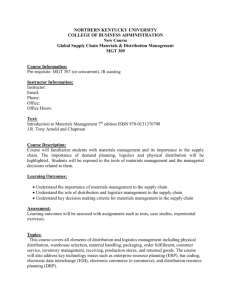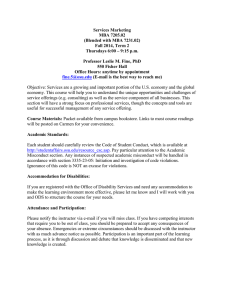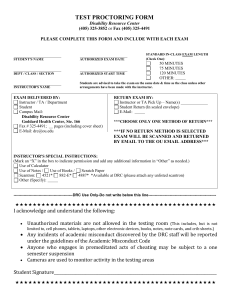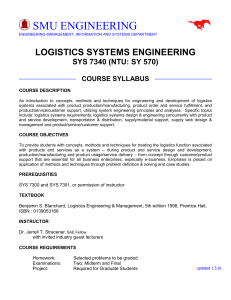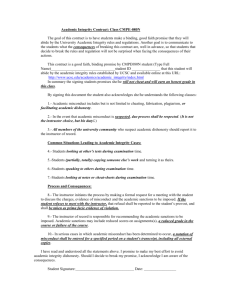BUSML 4380 – ADVANCED LOGISTICS MANAGEMENT First Session – Spring 2014
advertisement
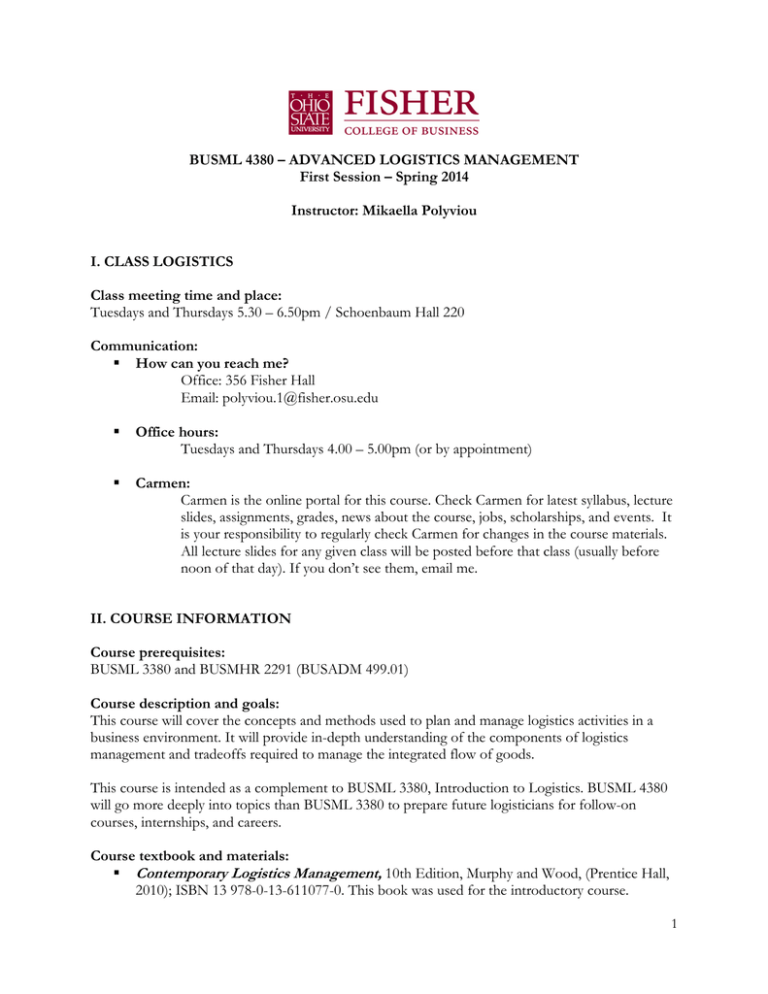
BUSML 4380 – ADVANCED LOGISTICS MANAGEMENT First Session – Spring 2014 Instructor: Mikaella Polyviou I. CLASS LOGISTICS Class meeting time and place: Tuesdays and Thursdays 5.30 – 6.50pm / Schoenbaum Hall 220 Communication: How can you reach me? Office: 356 Fisher Hall Email: polyviou.1@fisher.osu.edu Office hours: Tuesdays and Thursdays 4.00 – 5.00pm (or by appointment) Carmen: Carmen is the online portal for this course. Check Carmen for latest syllabus, lecture slides, assignments, grades, news about the course, jobs, scholarships, and events. It is your responsibility to regularly check Carmen for changes in the course materials. All lecture slides for any given class will be posted before that class (usually before noon of that day). If you don’t see them, email me. II. COURSE INFORMATION Course prerequisites: BUSML 3380 and BUSMHR 2291 (BUSADM 499.01) Course description and goals: This course will cover the concepts and methods used to plan and manage logistics activities in a business environment. It will provide in-depth understanding of the components of logistics management and tradeoffs required to manage the integrated flow of goods. This course is intended as a complement to BUSML 3380, Introduction to Logistics. BUSML 4380 will go more deeply into topics than BUSML 3380 to prepare future logisticians for follow-on courses, internships, and careers. Course textbook and materials: Contemporary Logistics Management, 10th Edition, Murphy and Wood, (Prentice Hall, 2010); ISBN 13 978-0-13-611077-0. This book was used for the introductory course. 1 Other required readings will be provided by the instructor on Carmen or via email. Some short readings will be provided by the instructor during class for in-class discussion. Teaching format: The course will be taught via a combination of lectures, discussions of readings assigned before and during class, and individual/team-based work. Classes will be as interactive as possible. Everyone is expected to participate in class and to prepare by reading the appropriate assigned readings prior to the class meeting. The lecture will cover the assigned topic, but will not necessarily cover the material as presented in the recommended text. Students may be called upon by name to discuss assigned topics and concepts. III. COURSE EVALUATION Grade distribution: I will base grades on the following allocation system: Assignment Mid-term exam Final exam Contemporary topic write-ups (2 write-ups x 5 points each) Inventory problems Points 35 45 10 10 100 *Extra credit: Contribution to the class (up to 5 points) Your final grades will be based on the following grade scale: Final grade scale 93.0 – 100% A 90.0 – 92.9 A87.0 – 89.9 B+ 83.0 – 86.9 B 80.0 – 82.9 B77.0 – 79.9 C+ 73.0 – 76.9 C 70.0 – 72.9 C67.0 – 69.9 D+ 60.0 – 66.9 D Below 60.0 E * Note: Please monitor your grades throughout the semester and contact me early (not at the last minute) to discuss your progress and address any concerns. 2 Mid-term and final exams (80 points in total): Absences that are not pre-arranged or covered by a valid excuse (per University policy) will result in a grade of zero for the exam. Students who show up late for an exam will only have the remaining time in the individual part of the exam period to complete the exam - they will not be given additional time. * Note: Engaging in ‘Fishing expeditions’ when answering questions is not acceptable. Example: if a question asks you to name 3 of the 7 (whatever) that we discussed, you will only be graded on the 1st 3 that you list. If you list 6 (for example) and the 1st 3 listed are wrong, and the remaining 3 are right, you will receive zero points. You cannot ‘fish’ for the right answer by listing everything it might possibly be, and expect me to pick from your selections which is the correct answer. You need to know the right answer, and provide it. * Makeup exams for scheduled exams missed by a student will not be administered unless the student has received prior approval by the instructor. A documented excuse will be required indicating either a valid medical or personal reason. Makeup exams may be in a different format than the exams taken by the class during regularly scheduled exam periods. The only acceptable reasons for missing an exam are: • Death in the family • Unforeseen medical emergency Contemporary topic write-ups (10 points in total): Two unique topic write-ups will be assigned during this class. Each topic will represent a real topic found in logistics and supply chain management. Each student is responsible to develop independently a 2-page (double space, max. font size 12) response to each of the topics. You might discuss the topic with other students. However, you must write up the answer on your own! Please submit your homework as a hardcopy at the beginning of the class on the day the assignment is due. Each response is worth 5 points; the two write-ups at 5 points each will total 10 points toward the final grade. Inventory problems (10 points): Students should work in teams of 2 or 3 to complete and submit the assigned inventory problems. More information about the inventory problems will be provided later in the semester. Opportunity for extra credit: Contribution to the class (up to 5 points): Contribution is different from participation! Contribution signals meaningful remarks during class discussion. Award of contribution points is based solely on the instructor’s subjective evaluation of the student’s contribution. Contribution will be assessed after the final exam, i.e., you will not know how many points you have prior to the final exam. IV. MY GROUND RULES Nameplates: It is important that I learn to match names and faces. I need your help. I will expect you to use a nameplate every day we meet, especially on exam days. 3 Late policy: Any assignments/projects that are late lose 20% of their declared value for every 24 hours that they are late after being due. Example: 20 minutes late means 20% off. 26 hours means 40%. Class attendance: Class attendance is not mandatory for this course but it is highly encouraged. Attendance will be taken during the first two weeks of class or until the class roster stabilizes. Students will be responsible for all material posted on Carmen, covered in required readings, and discussed during the lectures. If you miss a class, do not ask me for information/class notes regarding what you have missed. Please ask your fellow students! Teams: You will choose your team members on your own. Assign one person to communicate the team members to the instructor within the second week of the semester. Team sizes are limited by the class size, as depicted on the signup sheet (generally three members). Choose wisely! The issue of team dynamics, free ridership, and conflict resolution are as real for you here as they are in the real world. Feedback: Your feedback is valuable and it motivates continuous course improvement. Please do not hesitate to let me know, throughout the semester, how I can enhance your learning experience. Academic integrity: All tests, written exercises, and papers are to be your own work. Academic integrity is essential to maintaining an environment that fosters excellence in teaching, research, and other educational and scholarly activities. Thus, the Ohio State University and the Committee on Academic Misconduct (COAM) expect that all students have read and understand the University’s Code of Student Conduct, and that all students will complete all academic and scholarly assignments with fairness and honesty. Students must recognize that failure to follow the rules and guidelines established in the University’s Code of Student Conduct and this syllabus may constitute “Academic Misconduct.” The Ohio State University’s Code of Student Conduct (Section 3335-23-04) defines academic misconduct as: “Any activity that tends to compromise the academic integrity of the University, or subvert the educational process.” Examples of academic misconduct include (but are not limited to) plagiarism, collusion (unauthorized collaboration), copying the work of another student, and possession of unauthorized materials during an examination. Ignorance of the University’s Code of Student Conduct is never considered an “excuse” for academic misconduct, so I recommend that you review the Code of Student Conduct and, specifically, the sections dealing with academic misconduct. If I suspect that a student has committed academic misconduct in this course, I am obligated by University Rules to report my suspicions to the Committee on Academic Misconduct. If COAM determines that you have violated the University’s Code of Student Conduct (i.e., committed 4 academic misconduct), the sanctions for the misconduct could include a failing grade in this course and suspension or dismissal from the University. If you have any questions about the above policy or what constitutes academic misconduct in this course, please contact me. Disabilities: If you feel that you need an accommodation based on the impact of a disability, please contact me privately to discuss your needs in the first two weeks of the class. Also, contact the Office for Disability Services (ODS) at (614) 292-3307 or visit them at 150 Pomerene Hall. ODS will coordinate all accommodations for students with documented disabilities. Recording: Audio, video, or still photograph recording of lectures on any media, permanent or temporary, is not permitted without permission. The only exceptions will be those authorized in writing by the Office for Disability Services (see above). The presence, or even suggestion, of recording in a classroom discourages openness and spontaneity in students and the instructor. Other: All cellular phones, pagers and other electronic communication devices are to be turned off during class. Laptop computers are allowed for the purposes of note-taking. However, at any point the instructor reserves the privilege to ask that all laptops be closed if these devices are deemed to be a distraction. Course disclaimer: This syllabus is an outline for the course and can be changed based on extenuating circumstances, class progress, or by mutual agreement between the instructor and the students. 5 V: CLASS SCHEDULE I will make every effort to adhere to the below schedule. However, this schedule is tentative and can be changed depending on class progress and/or mutual agreement between the instructor and the students. As much advance notice of any changes will be given as is possible. Week 1 Date 1/7/2014 1/9/2014 2 Topic Class canceled due to weather conditions Introduction to the class Overview of logistics management 1/14/2014 Logistics strategic planning 1/16/2014 Customer service 3 4 5 Performance measurement and 1/21/2014 Selling the value of logistics 1/23/2014 Logistics outsourcing 1/28/2014 1/30/2014 Global logistics Forecasting and the bullwhip 2/4/2014 effect 2/6/2014 Inventory management 2/11/2014 Postponement - Speculation 6 Statistical economies in logistics 2/13/2014 Inventory centralization 7 Risk management and resilience 2/18/2014 in logistics and supply chains 2/20/2014 Final exam review 2/25/2014 8 Readings/ Assignments due Chap. 1 in Murphy and Wood (2010) Chap. 3 in Murphy and Wood (2010) (p. 44-46) Porter (1996) Due: Inform instructor about your team members Chap. 7 in Murphy and Wood (2010) Chap. 3 in Murphy and Wood (2010) Caplice and Sheffi (1994) Lambert and Burduroglu (2000) Due: Write-up 1 Mid-term exam Chap. 14 in Murphy and Wood (2010) Chap. 7 in Murphy and Wood (2010) Chap. 8 in Murphy and Wood (2010) Feitzinger and Lee (1997) Due: Write-up 2 Instructor notes Due: Inventory problems Sheffi and Rice (2005) Pettit et al. (2010) Final exam 6
